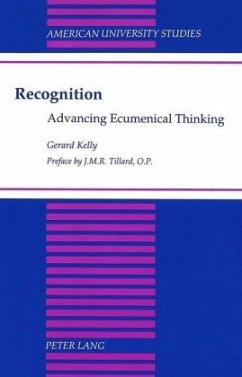When the Faith and Order Commission asked the Churches if they could recognise the faith of the Church in the text Baptism, Eucharist and Ministry , it effectively changed the way they participated in the ecumenical movement. The question about recognition was subtle and Churches are still trying to grasp its implications. Gerard Kelly's book is the first serious study of the notion of recognition. He shows that it can no longer be considered primarily in juridical terms and that it now has a theological content which contributes to the ecumenical understanding of what it means to be recognised by the Church.
"Gerard Kelly's book is without doubt one of the most serious works on the work of Faith and Order. We must thank him for it because it enlightens the whole movement." (J.M.R. Tillard, O.P.) "...an invaluable text, not only because it focuses on a neglected area of ecumenism, but because its argument is presented with clarity and conviction. For anyone engaged in ecumenical dialogue or those embarking on a study of ecumenism, the book is essential reading." (Margaret Jenkins, The Australian Catholic Record)

